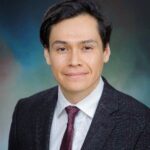Volume 37 Number 6 | December 2023
Juan Ulises Rojo, PhD, MLS(ASCP)CM

I believe that a strong community is founded on strong relationships between all of its members. It grows from relationships that are established on mutual respect and how each member takes care of each other within the community. A step towards maintaining a strong community in the laboratory is recognizing those special individuals around us. For that, I invite you to take a moment to reflect. Let’s think about those individuals that have helped us during our careers or have made an impact on our professional development.
From that professor who inspired us with her energy and intelligence, to the medical laboratory scientist who taught us techniques to work more efficiently in the lab. To the phlebotomist who made us understand the importance of communication, and to that person who showed us that camaraderie and kindness is possible under any setting, no matter how stressful the situation may be.
“We can make a difference in our peers both negatively and positively. Therefore, we need to be cognizant of our professional interactions if we want to build a strong laboratory community.”
Sometimes the interactions with these individuals are brief, are long gone, and we lose all contact with them. Sometimes we form long-lasting relationships with those individuals, and they become part of our personal life. Sometimes we don’t even know these individuals in person as they can be authors of articles or textbooks that accompanied us during our studies or are “celebrities” within our field who we never get a chance to meet. Regardless, these are just examples of the types of interactions that form part of our laboratory community, and I am sure that all of us have encountered at least one person who has had an influence in our careers. And while we may not be able to pay back those who have helped us or been an inspiration to us, we should always be thinking about those special individuals if we are to continue building a strong professional community.
We can make a difference in our peers both negatively and positively. Therefore, we need to be cognizant of our professional interactions if we want to build a strong laboratory community. We can take this to our day-to-day and make efforts in making those daily interactions with our coworkers more meaningful by ensuring them that they can count on us, and we can count on them.
I would like to focus on a specific interaction that can make our laboratory community even stronger. That is breaking the generational gap and improving retention. We can make an impact on the Developing and Ascending Professionals who are just joining our lab community.
To those of you with years of experience, I invite you to lend an ear and listen to those ideas from eager young professionals who are motivated and full of energy. Encourage their creativity, establish fruitful discussions to innovate, and recognize new ways of doing things. Times are changing, and we need to be receptive to those novel ideas if we want to continue attracting new professionals that will be taking our place as we eventually retire. All of us were the new one at some point in our careers.
At the same time, to those who are just joining the field. I encourage you to have an open ear and listen to those words of knowledge from senior personnel. Be receptive to their feedback by learning from their experiences and seek their input and advice. Try to follow the norms of your new environment and complement them with your strengths. Observe what is around you and find value in what has already been achieved.
Harmony between the conventional and the contemporary is part of what makes a community strong. Let’s continue working together to make our laboratory community grow stronger. Recognize and take opportunities for professional growth, be confident in your abilities, be humble when either in the role of a mentor or mentee, share your ideas to bring changes in your workplace, and spread the word about the wonderful world of the laboratory and all the people that work in it.
Disclaimer: The thoughts, views, and opinions expressed in this article are not affiliated, associated, authorized, endorsed, or officially connected to my employer.
Juan Ulises Rojo is Assistant Professor at the University of Texas Medical Branch in Galveston, Texas.